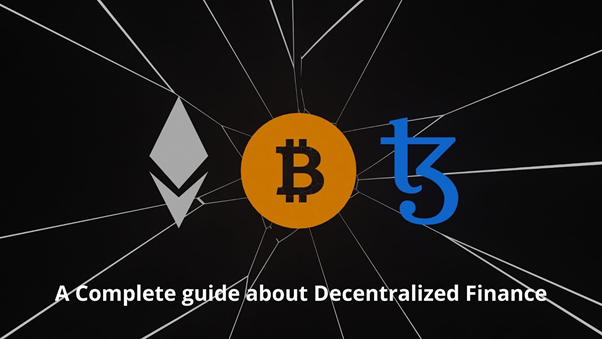A Complete guide about Decentralized Finance
Decentralized finance or DeFi has become a buzzword in recent times. It has significantly influenced the financial ecosystem and brought about a big change. At present, there are different views among people relating to decentralized finance DeFi. While some see it as a great opportunity, others view it as a potential scam. For this reason, there exists a lot of confusion relating to DeFi.
Millions of people worldwide are interested in participating in the new finance system. If you want to gain clarity about what is decentralized finance and know it in detail, then you are at the right place. In this complete guide to decentralized finance, you will get to know what it is, its benefits and risks, the use of DeFi, and its future. Before diving into the details, let’s start with what is decentralized finance DeFi.
What is Decentralized Finance?
For people new to the term, it is first important to understand what is decentralized finance actually. DeFi is an ecosystem of various financial applications built over blockchain networks. It is a shift from the centralized, traditional financial system to decentralized, peer-to-peer finance.
DeFi aims at creating a permissionless, transparent, and open-source financial ecosystem that is readily available to everyone. It eases financial operations by eliminating the need for any central authority. Moreover, the users can get complete control over their financial assets and interact through decentralized apps. In order to know all about decentralized finance in greater detail, taking up a DeFi course can help.
Benefits of Decentralized Finance
Now that you know what is decentralized finance Defi, the next thing is to know is what its benefits are. DeFi can provide you with a number of benefits. It leverages the principles of blockchain technology in order to enhance financial security and offer ample growth opportunities. Moreover, it helps in the creation of a standardized financial system. Here are some of the top benefits of DeFi.
Programmability
Programmability is the first and foremost benefit of DeFi. The programmable smart contracts help in automating execution. Moreover, it enables the creation of new digital assets and new financial instruments.
Interoperability
DeFi applications are built to facilitate easy integration. With decentralized finance, product teams and developers have the flexibility to customize interfaces and easily integrate different third-party applications. Moreover, it also allows the developers to build over the existing protocols.
Immutability
Immutability is another benefit of decentralized finance DeFi. It helps in preventing any kind of tampering of data. It enhances auditability as well as the security of financial data.
Transparency
While giving an introduction to decentralized finance, the benefit that is highlighted the most is its transparency. Every transaction on the network is visible to the users. The level of transparency it offers helps in rich data analysis. Moreover, it makes the network activity readily available to all the users.
Permissionless
Unlike the traditional finance systems, decentralized finance offers permissionless access. It means that anyone with an internet connection and a crypto wallet can access the DeFi applications. Moreover, at times, no minimum amount of funds is even essential.
Potential Challenges of DeFi
While DeFi can provide you with a number of benefits, there are certain drawbacks too. For a better understanding, it is essential to get an idea of both the pros and cons of the technology. Here are some of the potential challenges relating to DeFi.
Chances of User Error
DeFi only eliminates the need for intermediaries. However, it does not take responsibility for the errors made by users. Users are responsible for all their assets and funds. In case of human errors, you will have to face the consequences.
Scalability
Scalability is also an issue with decentralized finance. While it facilitates financial inclusion for a number of users, difficulties may arise during the scaling-up process. Moreover, DeFi transactions require a lot of time.
Use Cases of Decentralized Finance
An introduction to decentralized finance will not be complete without its use cases. Right from asset management to gaming, there are a lot of use cases of DeFi. It has opened up new opportunities for users across the globe. DeFi is actually much more than just an emerging financial ecosystem. Some of the popular use cases of decentralized finance are:
- Data and analytics
- Asset management
- Borrowing and lending
- Synthetic assets
- Margin trading
- Tokenization
- Insurance
- Gaming
- Trading
- Payments
- KYT and compliance
- Monetary banking services
- Decentralized marketplaces
Final Words
This is all about decentralized finance. Now that you have a complete guide to decentralized finance, you are ready for the shift. In the years to come, you will see all the financial services being rebuilt on the open finance ecosystem. However, the complete decentralization of financial systems will take time. Addressing the various concerns relating to DeFi can help in increasing the adoption of the open-source ecosystem.
